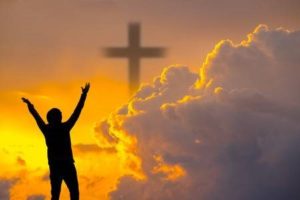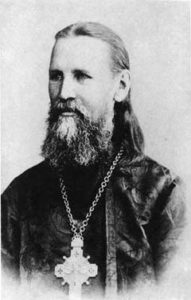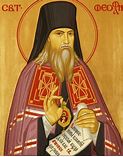SSCORRE!
Saint Sophia Cathedral
Online Resources for our Religious Edification

Topic of the Week – Adaptation Is Incompatible with Orthodoxy
“Many times we may have the impression that God does not see what is happening in His Church. Unfortunately, some people like to believe that they need to use their power to somehow save the Church. Poor, pitiful people! You are not here to save the Church. The Church will save you. Do you know how terrible this attitude is? It is blasphemy, blasphemy of the first degree. We are being ludicrous when we think that we can save the Church. We will save the Church, the Ark of salvation all through the centuries? Then the Church does not save, if She is in need of salvation Herself from time to time! The Church does not need our help. Simply put, if we work for the Church, we will save ourselves, not the Church…”
Excerpted from Revelation – The Seven Golden Lampstands (volume 1) 2nd edition — Zoe Press p114
Adult/Family:
“Did Adaptation (Sergianism) [see High School below] save the Russian Orthodox Church?
… it is clear that not only did it not save the Russian Orthodox Church during the despotism of Stalin but on the contrary it furthered the loss of genuine freedom of conscience and the conversion of the Church Administration into an obedient tool of the atheistic regime…. one cannot defend the Church by a lie…
Adaptation is little faith, lack of faith in the power and Providence of God… incompatible with true Christianity, because at its foundation there is a lie, servility before the mighty of this world, and a false separation of spiritual needs into the purely religious and the socio-political.
According to the teaching of Christ, faith must direct the inellectual, family, and social life of every Christian. Ye are the salt of the earth; ye are the light of the world (Matt 5:13, 14) said Christ, addressing his followers….” Russia’s Catacomb Saints, p472“…A conscious, systematic, and diabolically ingenious battle is being waged for the possession of the human soul, against God. This is the chief aim, and everything else is subordinated to it. Qualitatively the forerunners of Antichrist have already made his kingdom a reality there [Soviet Union]. The actual Antichrist will devise nothing new: it will only remain for him to disseminate the methods of the Soviet NKVD (Secret Police) to the other five-sixths of the earth’s surface. The only bright, joyful, and encouraging phenomenon there is the existence of the Catacomb Church, the Church of the wilderness. It permits us to evaluate optimistically the battle of the Russian soul with atheism: there, the infallible Church has been preserved, against which, as Christ has promised us, the gates of hell shall not prevail…“
See also I. M. Andreyevsky: ‘Russia’s Catacomb Saints’ – The Catacomb Church, Part 1
Preschool/Elementary:
“Valentine [Saint Luke] had a very deep faith which was proven by his life and deeds. In the operating room, there was always an icon of the Theotokos hanging on the wall and he used to pray in front of it before every operation.
One day, the atheist leaders who had seized power in Tashkent ordered that the icon was to be taken down from the wall. This caused Doctor Valentine great distress. Saying he could not operate until the icon was restored to its place, he walked out of his office.
Just a few hours later, the wife of one of the city’s atheist leaders was brought to the hospital. She was in a serious condition and the doctors at the hospital called for Doctor Valentine, the only one who could operate on her. But he replied with the same determination, “I am sorry that I cannot help you, but I will not perform any surgery as long as the icon is not in its place.” Seeing that they had no choice, the atheists brought back the icon. Doctor Valentine operated on the woman, and with the blessing of the Theotokos, saved her life.”
Excerpted from the book Holy Hierarch Luke of Crimea
Do you pray in front of your icons when you have a task to do, like Saint Luke? What would you do if in order to keep your job, you were being made to do something that went against your religious beliefs? Would you do it (adapt to the new rules) or not? What if it meant losing your job? Will you have the courage, like him, to pray and be Orthodox not just in church but at all times, everywhere you are – at home, at work, in a restaurant, etc.?
May God give us the strength to be as steadfast and as faithful as Saint Luke!!
Middle School:
The years during which communism flourished in Russia in the 1900s were difficult times for the Church. In addition to thousands of churches being physically destroyed to prevent worship, many priests, bishops, and faithful were wrongfully imprisoned and killed in order to weaken the Church. Communists threatened and coerced priests and hierarchs to do things that went against their beliefs.
“While keeping him in prison, the communists tried again, even more cunningly, to persuade Saint Luke to give up the episcopate. They went so far as to promise him that they would establish a medical research institute just for him. Assaulted by this and many additional deceptive proposals, the Saint gave in, saying he would stop serving as bishop. But the Saint would regret this fall for the rest of his life. In addition to not keeping their promise, the communists sent him into exile once again.
When he was finally released, Saint Luke could not find his peace anywhere because he had denied his call to shepherd the people and he was living in a state of disobedience to God. He was working again in a hospital in the city of Krasnoyarsk, but his operations were not as successful as before, and he was getting increasingly tired. Moreover, due to an illness, he became blind in his left eye.
This painful situation ended in 1943, when the Church proposed that he become Archbishop of Krasnoyarsk. Saint Luke accepted and began to dedicate himself earnestly to the ministry and preaching the Gospel. He had an even busier schedule than before, yet the fatigue he had previously felt departed from him and he miraculously recovered. He understood now how much he had wounded the love of God through his deed and he thanked Him with unceasing tears of gratitude for the Lord had never deserted him.“
Excerpted from the book Holy Hierarch Luke of Crimea
Why did Saint Luke regret giving in to the communists to stop serving as Bishop? (There are 2 answers, one is a spiritual one, and one is a material/practical one.) Do we sometimes wound God with some of the things we do? Thankfully God does not abandon us when we make a mistake! We can always go to confession to repent of our mistakes.
Have you ever heard the expression, ‘good is not good if not done in a good way’? Both Saint Ephraim of Syria and Saint John of Damascus said this. What was the good thing Saint Luke thought he was trying to do and what was the bad way in which he did it?
Can you name any examples of modern day situations this applies to? You should be on your guard when you see ‘good things’ that are being done in a ‘bad way’ and avoid participating in them at all costs so that you are not disobedient to God and wound Him.
High School:
In Communist Russia, there were some hierarchs who viewed “…the Church first of all as an organization, whose outward form must be preserved at any cost; disobedience to or separation from this organization is regarded as an act of “schism” or even “sectarianism.”
” The hierarch Metropolitan Sergius signed a declaration with the communists which said that the Church would be underneath the State and adhere to the State rules. “The apologists for Sergianism… continually emphasize that Metropolitan Sergius’ policy ‘preserved’ the hierarchy, the church organization, the church services, the possibility of receiving the holy mysteries and that this is the chief business of the church or even its whole reason for existing…. The other view… sees the first responsibility of the Orthodox Church to be faithfulness to Christ and to the true Spirit of Orthodoxy, at whatever external cost.”
“By my new church policy I am saving the Church,” Metropolitan Sergius replied deliberately. “What are you saying, Vladika!” all members of the delegation exclaimed with one voice. “The Church does not have need of salvation,” added Archpriest Dobronravov, “the gates of hell shall not prevail against it. You yourself, Vladika, have need of salvation through the Church.” (p99)
But against the spiritual weapons of Christ’s warriors, the evil one gathered all the forces of the world’s first satanist regime. The interdictions of Metropolitan Sergius were the sign for the Soviet Political Police to arrest and banish the protesting bishops; even many who attended Sergius’ own “legal” churches were not spared by the authorities, and the chief result of the policy of “sergianism” – to quote the words, born of bitter experience… was that “Metropolitan Sergius’ actions saved nothing except his own skin.” p116
Read Russia’s Catacomb Saints by I.M. Andreyev
How does faithfulness to Christ differ from preserving the church ‘organization’? What is the true spirit of Orthodoxy?
Have you ever heard the expression, Good is not Good, if not Done in a Good Way? Both Saint Ephraim of Syria and Saint John of Damascus said this. What was the good thing Metropolitan Sergius thought he was trying to do and what was the bad way in which he did it?
A Message from Maria Spanos
I am passionate about our Orthodox Christian faith and seek to help others learn as much as they can about it. My purpose here is to share online resources that help strengthen our relationship with Christ and bind us closer to His Church. I believe they are invaluable in learning about our precious Orthodox Tradition, and are a great aid for teaching family members, friends and others about Orthodoxy. ~Maria
Two of my favorite quotes:
 “A true Christian behaves in this life so that it may be a preparation for the future one and not only a life here below. In his actions, he does not think what will be said of him here but of what will be said there in heaven; he represents to himself that he is always in the presence of God, of the angels and all the saints, and remembers that someday they will bear witness of his thoughts, words, and deeds.” — Saint John of Kronstadt
“A true Christian behaves in this life so that it may be a preparation for the future one and not only a life here below. In his actions, he does not think what will be said of him here but of what will be said there in heaven; he represents to himself that he is always in the presence of God, of the angels and all the saints, and remembers that someday they will bear witness of his thoughts, words, and deeds.” — Saint John of Kronstadt
__________________________________________________________

“Of all the holy works, the education of children is the most holy.”
— St. Theophan the Recluse






